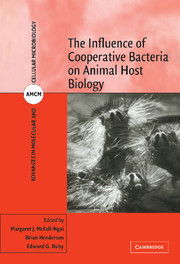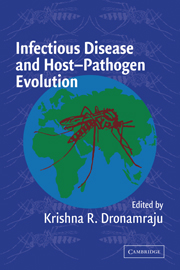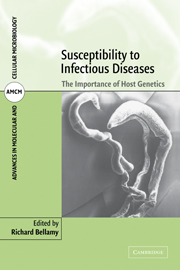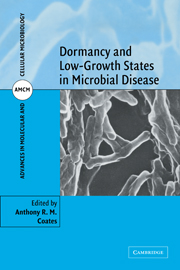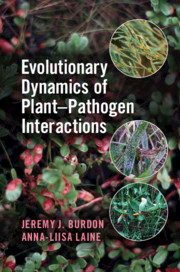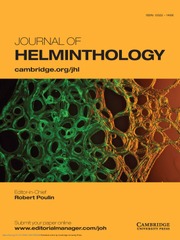The Influence of Cooperative Bacteria on Animal Host Biology
£120.00
Part of Advances in Molecular and Cellular Microbiology
- Editors:
- Margaret J. McFall Ngai, University of Hawaii, Manoa
- Brian Henderson, University College London
- Edward G. Ruby, University of Hawaii, Manoa
- Date Published: November 2005
- availability: Available
- format: Hardback
- isbn: 9780521834650
£
120.00
Hardback
Looking for an inspection copy?
This title is not currently available on inspection
-
Ninety percent of the cells in the human body are bacteria, and humans may be host to many thousands of different species of bacteria. These striking statistics are part of a new paradigm in microbiology in which bacteria are no longer viewed as disease-causing killers but more as lifelong partners which are often essential for the survival of their host. This book brings together a group of diverse scientists - evolutionary biologists, immunologists, molecular biologists, microbiologists, pathologists and mathematicians - to discuss the evolution and mechanisms of bacteria-host interactions at all levels of complexity. Chapters deal with the evolution of these interactions over the last 60 years (since the introduction of antibiotics) to a period of 3.8 billion years (since the evolution of single-celled life) and discuss bacterial interactions with multicellular life forms from coral reefs to humans. Researchers and graduate students across the life sciences will find this book of interest.
Read more- First book to deal with the biology, including evolutionary biology and pathobiology, of bacterial interactions with their hosts
- Covers a broad range of hosts from coral reefs to humans
- Provides an interdisciplinary approach to this subject for the first time, with contributions from leading experts worldwide
Reviews & endorsements
'The title of this collection of reviews hints at a refreshing new angle regarding the interplay between a range of hosts and their associated bacterial communities.' Microbiology Today
See more reviews'This work is strongly recommended to all bacteriologists, immunologists, general microbiologists, biologists, zoologists, epidemiologists and ecologists.' Immunological Investigations
Customer reviews
Not yet reviewed
Be the first to review
Review was not posted due to profanity
×Product details
- Date Published: November 2005
- format: Hardback
- isbn: 9780521834650
- length: 454 pages
- dimensions: 229 x 152 x 25 mm
- weight: 0.77kg
- contains: 58 b/w illus. 13 colour illus. 10 tables
- availability: Available
Table of Contents
Part I. Evolutionary Biology of Animal Host-Bacteria Interactions:
1. How have bacteria contributed to the evolution of multicellular animals? Carol Hickman
2. The interface of microbiology and immunology: a comparative analysis of the animal kingdom Margaret McFall-Ngai
3. Co-evolution of bacteria and their hosts: a marriage made in heaven or hell? Jörg Hacker, Ulrich Dobrindt, Michael Steinert, Hilde Merkert and Ute Hentschel
4. Industrial revolution and microbial evolution Fernando de la Cruz and Julian Davies
5. Bacteria evolve and function within communities: observations from experimental Pseudomonas populations Paul B. Rainey
Part II. Bacterial Ecology and the Host as an Environment:
6. Coral symbioses: the best and worst of three kingdoms Eugene Rosenberg
7. Interactions between inherited bacteria and their hosts: the Wolbachia paradigm Zoe L. Veneti, Max Reuter, Horacio Montenegro, Emily A. Hornett, Sylvain Charlat and Gregory D. Hurst
8. Microbial communities in lepidopteran guts: from models to metagenomics Jo Handelsman, Courtney J. Robinson and Kenneth B. Raffa
9. Commensal diversity and the immune system: modelling the 'host-as-network' Robert M. Seymour
Part III. Cellular Interactions at the Bacteria-Host Interface:
10. Beneficial intracellular bacteria in the Dryophthoridae: evolutionary and immunological features of a pathogenic-like relationship Abdelaziz Heddi and Caroline Anselme
11. Regulation of Bordetella-host interactions: mechanisms and evolution Seema Mattoo and Jeff F. Miller
12. Resident bacteria as inductive signals in mammalian gut development Lora V. Hooper
13. Virulence or commensalism: lessons from the urinary tract Göran Bergsten, Björn Wullt and Catharina Svanborg
Part IV. Bacterial Interactions with the Immune System:
14. Host responses to bacteria: innate immunity in invertebrates L. Courtney Smith
15. Bacterial recognition by mammalian cells Clare E. Bryant and Sabine Tötemeyer
16. Moonlighting in protein hyperspace: shared moonlighting proteins and bacteria-host crosstalk Brian Henderson
17. Cell signalling pathways as targets for bacterial evasion and immunity Andrew N. Neish
18. Shaping the bacterial world by human intervention Rino Rappuoli.
Sorry, this resource is locked
Please register or sign in to request access. If you are having problems accessing these resources please email [email protected]
Register Sign in» Proceed
You are now leaving the Cambridge University Press website. Your eBook purchase and download will be completed by our partner www.ebooks.com. Please see the permission section of the www.ebooks.com catalogue page for details of the print & copy limits on our eBooks.
Continue ×Are you sure you want to delete your account?
This cannot be undone.
Thank you for your feedback which will help us improve our service.
If you requested a response, we will make sure to get back to you shortly.
×
